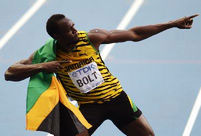 Death toll in Philippine ship collision climbs to 31
Death toll in Philippine ship collision climbs to 31
 Guangzhou rail service suspended, 80,000 affected
Guangzhou rail service suspended, 80,000 affected
 Beijing Int'l Light Festival kicks off
Beijing Int'l Light Festival kicks off
 Indian-controlled Kashmir celebrates Independence Day
Indian-controlled Kashmir celebrates Independence Day
 Reservoirs in S China start to release floods
Reservoirs in S China start to release floods
 Asian Youth Games opens in Nanjing
Asian Youth Games opens in Nanjing
 How do North Koreans stay cool in summer?
How do North Koreans stay cool in summer?
 China Beijing Int'l Gifts, Premium&Houseware Exhibition opens
China Beijing Int'l Gifts, Premium&Houseware Exhibition opens
 Incredible gardens around the world
Incredible gardens around the world
In the search for gold, either it be on a medal or in championship winning, the investment is in training and dedication. Belle Taylor talks to the coaches to find out what it takes.
In downtown Beijing, in a basement in a residential complex, there is a 7-year-old boy with a bunch of golf balls. He is carefully balancing them to make a tower, oblivious to the adults speaking in serious tones around him.
His Norwegian coach, Andy Friis, is chatting to his father about the day's lesson, the parent eager to hear how his son is progressing, Friis charges up to 1,200 yuan ($196) an hour for his expertise.
This is the Players Club, a golf haven in the middle of Beijing.
Large screens depict lush, rolling grass in front of miniature putting greens in a rabbit warren of rooms, each no bigger than a studio apartment. Golfers can hit a virtual ball into the virtual distance, spending hours perfecting their real-life golf swing without having to venture beyond the fourth ring road.
The next Chinese golf star might be breathing the fresh air at Mission Hills Golf Club in Guangdong province, but he or she could also be perfecting their putting to the sounds of electronic nature noises piped through speakers at an underground bunker that looks more nightclub than golf club.
In a country with land and water shortages, indoor golf clubs provide a way for the game to be played without sucking up valuable resources.
"I think (clubs such as these) are a good idea, because we have a big population and we don't have much land," says Song Huaxun from the CGA. "If you want more people to know golf these clubs need less land area, and cost less money."
Friis, co-founder of the Player's Club, is passionate about golf development. He may charge big money for his one-on-one training, but he also pours his time into developing golf at a grassroots level, staging tournaments to give youngsters more opportunities to play.
Friis has been involved in golf in China since 2005, when he first came to the country, excited about the opportunities in China. While he is still excited, he says the game has developed more slowly than he expected, but that it started to change in 2009, with the Olympic announcement.
"Now you see golf developing on a different level," says Friis. "Before it was private, and government policies were probably a little bit against golf. But now different provinces are putting money into club development, and different provincial teams."
Friis' grand plans are helped by his association with Kel Llewellyn, a straight-talking Australian who is best-known as coach to China's No 1 player Liang Wenchong. He also knows a thing or two about developing golf in a country new to the sport.
Llewellyn is something of a golfing legend in Asia, having worked in India, Bhutan, Thailand, Malaysia, Singapore and Indonesia setting up junior programs. He is passionate in his belief that to become a strong golfing nation, you need a strong junior program.
"I think if golf wants to progress more quickly, it needs competition between the provinces. Our plan - Andy and mine - is to start this," says Llewellyn. "You need to have a lot of competition, this is how it's done."
Friis, 30, and Llewellyn, 72, are both wary, however, of the single-mindedness in which some wealthy Chinese families are pursuing their golfing dream.
"We find kids are starting as young as 3 or 5, or 6 and 7. They'll get wrist problems and back problems, especially if the technique is not taught properly," says Llewellyn.
 |
 Premier Li: We rely on farmers for a living
Premier Li: We rely on farmers for a living Floods force evacuation of 80,800 people in NE China
Floods force evacuation of 80,800 people in NE China Top 10 pricey destinations for studying abroad
Top 10 pricey destinations for studying abroad 173 killed, 1,330 others injured in clashes across Egypt
173 killed, 1,330 others injured in clashes across Egypt Beijing Int'l Gifts, Premium & Houseware Exhibition opens
Beijing Int'l Gifts, Premium & Houseware Exhibition opens Bolt claims 200m title at IAAF World Athletics Championships
Bolt claims 200m title at IAAF World Athletics Championships Escort taskforce holds anti-hijacking drill
Escort taskforce holds anti-hijacking drill Egypt's clashes kill 525 so far
Egypt's clashes kill 525 so far Sex offenders prey on left-behind kids
Sex offenders prey on left-behind kids Jaguar Land Rover to recall 11,852 cars
Jaguar Land Rover to recall 11,852 cars Ballet Swan Lake rehearsed in Taipei
Ballet Swan Lake rehearsed in Taipei  The five Hutong areas of Beijing
The five Hutong areas of BeijingDay|Week|Month